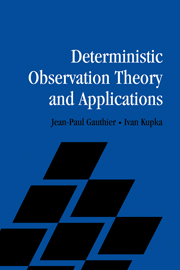Book contents
- Frontmatter
- Contents
- Preface
- 1 Introduction
- Part I Observability and Observers
- 2 Observability Concepts
- 3 The Case dy ≤ du
- 4 The Case dy > du
- 5 Singular State-Output Mappings
- 6 Observers: The High-Gain Construction
- Part II Dynamic Output Stabilization and Applications
- Appendix
- Solutions to Part I Exercises
- Bibliography
- Index of Main Notations
- Index
6 - Observers: The High-Gain Construction
Published online by Cambridge University Press: 14 August 2009
- Frontmatter
- Contents
- Preface
- 1 Introduction
- Part I Observability and Observers
- 2 Observability Concepts
- 3 The Case dy ≤ du
- 4 The Case dy > du
- 5 Singular State-Output Mappings
- 6 Observers: The High-Gain Construction
- Part II Dynamic Output Stabilization and Applications
- Appendix
- Solutions to Part I Exercises
- Bibliography
- Index of Main Notations
- Index
Summary
The subject of this chapter is observers. The purpose of an observer is to obtain information about the state of the system, from the observed data. In Section 1 of this chapter, we are going to discuss the concept of observers. The main ingredient of that concept is the notion of “estimation.” There is no completely satisfactory definition of estimation. For that reason, we have to present several definitions of an observer, each having its domain of application. We shall explain these different definitions of observers and point out the relations between them.
In the remainder of the chapter, we shall construct explicitly several types of observers. The fundamental idea behind all of these constructions is to use the classical observers for linear systems and to kill the nonlinearities by an appropriate time rescaling.
The construction and its variations that we present provide explicit, efficient, and robust algorithms for state estimation. It is closely related to the results of the three previous chapters (3, 4, 5), and it applies in all the cases which were dealt with in these chapters.
Our observers can be used for several purposes:
estimation in itself.
output stabilization.
They will be used in Chapter 7 for purpose 2.
Defining an observer presents several problems. First, there is no good definition of a state observer when the state space X is not compact. A second difficulty is the peak phenomenon, explained below in the Section 1.2.2, for observers with arbitrary exponential decay.
- Type
- Chapter
- Information
- Deterministic Observation Theory and Applications , pp. 86 - 122Publisher: Cambridge University PressPrint publication year: 2001



